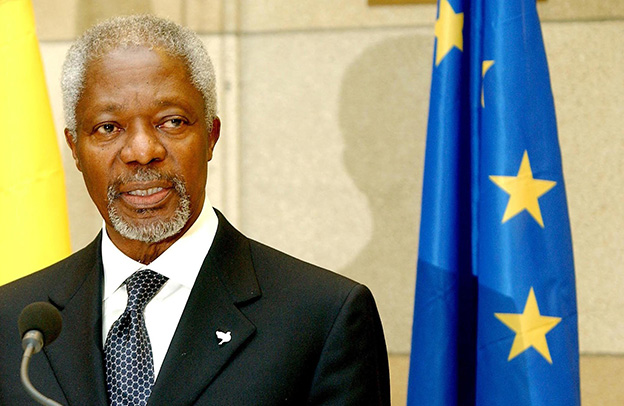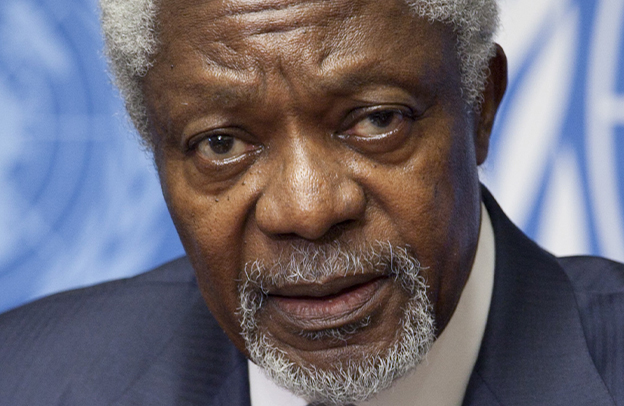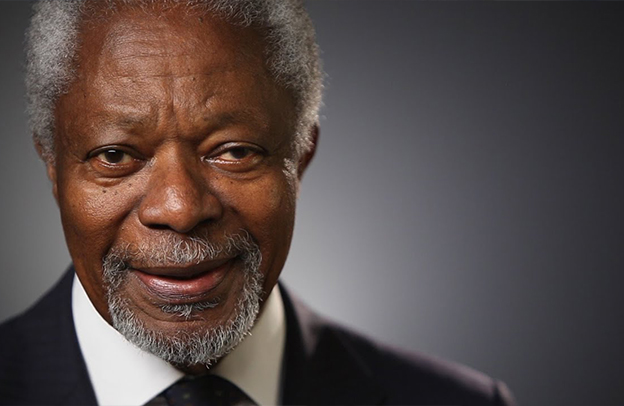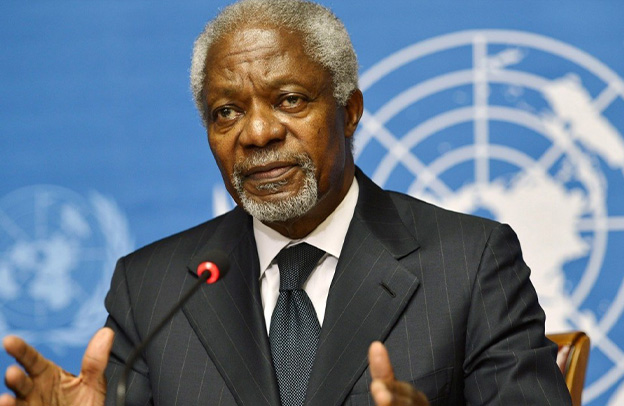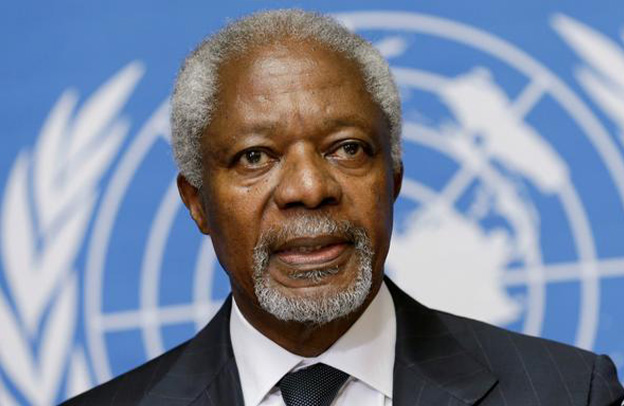Africa in the 21st Century Challenges and Opportunities: Kofi Annan Series
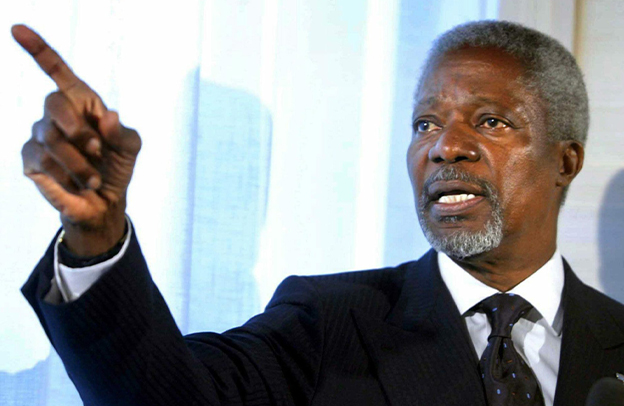
In recent years, Africa has seen rapid economic growth that is changing the continent’s socio-economic landscape. However, there are also many challenges that face this region. In order to address these challenges, African countries must take a unified approach to achieve sustainable development. This is a continuation of our (Kofi Annan Series). Click here to see more from the series.
Download the first chapter of The Storytelling Series: Beginners’ Guide for Small Businesses & Content Creators by Obehi Ewanfoh.
In this speech, given in Lagos, Nigeria, we hear Kofi Annan, Former Secretary-General of the United Nations calls on African leaders to take greater responsibility for its own problems and solutions.
Ambassador (Hamzat) Ahmudu, Your Royal Majesty/Highness, distinguished friends.
I am honoured to be with you today to help mark the centenary of a remarkable man. An outstanding son of both Nigeria and Africa, Chief Obafemi Awolowo was a man of vision and courage, of intellect and leadership.
Identifying the challenges facing our continent long before many others, he also worked tirelessly to find solutions which would allow us to overcome them. He developed practical policies when Premier of the then western Province of Nigeria designed to improve life for all citizens and to lay the foundations needed for further progress in this country.
Above all, he understood the critical importance of unity, democracy, the rule of law and honest and effective government to fulfilling our ambitions. He believed passionately in the potential of this country and of Africa as a whole.
But while recognising that Africa had inherited many of its problems, he also believed – as I do – that responsibility for overcoming these challenges lay primarily here on this continent.
Such was his remarkable life and impact, I could easily spend the rest of this speech talking about his qualities and achievements. But this would do the man popularly known as Awo an injustice. For it was the future, not the past, which was always his prime focus.
So as we celebrate his centenary today, I intend to follow his lead and look ahead.
Here is another article you might like – Talking About The Crisis of Democracy by Kofi Annan: Kofi Annan Series
I want to reflect, with Awo’s principles of unity and democratic government as a guide, on how we can best address the challenges and opportunities facing Africa in the 21st century. I also want to gauge how far we have to travel to fulfil his ambition of a peaceful and progressive continent.
Two decades after Awo’s death, the picture is mixed. More positive than many outside commentators acknowledge. But not as positive as the talents and potential of the people of this continent deserve. Out of the headlines, there has been real, significant and widespread progress.
Africa is still tragically the home of nearly half the world’s armed conflicts, and three quarters of the UN’s peacekeepers. But the number of conflicts across Africa has fallen sharply in recent years. Liberia, Burundi, and Angola are just some of the countries which now have real hope of a peaceful future.
Mozambique is an inspiring example of how a country and people can heal deep wounds and set themselves on a course to stability, democracy and prosperity.
Africa’s economies, too, have been performing strongly. Economic growth, particularly over the last decade, has outstripped rates in the developed world. Inflation and debt has fallen.
Democracy, too, is on the move in Africa, with many more multi-party elections being held across the continent. We have seen a new generation of leaders coming to the fore, sharing Awo’s belief in governing for the good of all the people.
The numbers living in poverty has declined as we have seen substantial extra investment in education, health and infrastructure. Awo would have been pleased with this progress. But he would have been disappointed, too, at the problems that remain.
On peace and security, economic and social development and governance and human rights – the three inter- connected pillars on which Africa’s continued progress rests – there is much still to be done.
Our continent also faces new and serious threats which risk undermining all that has been achieved so far.
Economic and social progress, and the very stability of societies, are threatened by both the global financial crisis and climate change.
It is the developed world which is responsible for these challenges. It is, however, the developing world – and Africa in particular – which is likely to feel the greatest pain. We have every right to expect and demand help to alleviate their impact on our continent.
But across many areas, too, we have to work harder to put our house in order. Much of the conflict which continues to scar our continent is fuelled by ethnic and tribal tensions.
Africa has, of course, struggled with a post-colonial legacy of nations created with little regard to history or culture. This result has been societies weakened from the start by division along ethnic and tribal grounds.
Where there are already divisions on ethnic or tribal lines, it is all too easy for suspicion and grievances to be fanned into anger and violence.
We tragically saw the result of this in the post-election violence in Kenya last year.
It is time for Africa to move beyond these old ties and look to anchor our identities more in our nations, and shared goals and concerns. The cloak of government must protect all. Inequalities based on ethnic background are the fault lines on which societies fracture. There must be equal access to opportunity for all.
Healing these divisions needs good, democratic leadership and strong civil societies.
They create theinstitutions, legitimacy, culture and accountability needed to defuse tensions and promote stability.
We need much greater effort both nationally – and with international support – to build up the strength of our institutions and civil society.
With good leadership, robust institutions and a strong civil society, closely-fought elections can translate into peaceful transitions of power, as we have seen in Ghana. Without them, the risk is newly forged peace can easily slip back into crisis as we have seen in Mauritania, Guinea and Madagascar.
We need, too, political leaders across our continent to recognise that democracy means they can be voted out as well as into power. It is a profound shame that since independence so many of Africa’s leaders, once elected, come to believe that only they can be trusted to run their countries. The result, all too quickly, becomes Government for the benefit of a ruling elite rather than society as a whole.
We must, too, find ways to attract a much larger number of talented young African men and women into politics and public service. We need them in the public as well as the private sector.
Good political leadership, high standards of governance and tough anti-corruption practices are also essential to ensure the continent’s natural wealth is used to improve the health and strength of societies.
For too many countries in Africa, natural resources have not been a boon but a curse. Rather than being an engine for growth and development, they have fuelled instability and conflict, seen human rights flouted and encouraged and entrenched corruption.
We must see much greater transparency in the revenues which Governments receive from the extraction of natural resources and how this money is spent. And African leaders, too, must work harder to ensure the continent’s natural wealth is not simply siphoned off by other countries.
Fifty years ago, Awo warned about the street beggar attitude where Africa was happy to accept whatever fortune came their way from natural resources. He was right. And we don’t need to look outside Africa to find a better model.
There is no country in the world which can match the growth of Botswana since independence – and few with a better record of using natural wealth to help diversify the economy or invest in the health and society of its people. The strong emphasis put on education in Botswana would also delight the man we are honouring today who understood that our continent’s greatest resource is its human capital.
He would be heart-broken that half a century after introducing universal primary education in western Province, that only two-thirds of Africa’s children are enrolled in school.
He would be shocked, too, that in too many places on this continent, human rights are disregarded, the rule of law ignored and the culture of impunity remains embedded. We cannot allow this to continue.
It is a major step in tackling this culture that we are seeing Special Tribunals holding to account politicians and rebel commanders from Liberia, DRC, Sudan, and Uganda for war crimes and crimes against humanity.
I have, of course, a personal stake in the International Criminal Court which was established during my tenure as Secretary-General of the United Nations. But those who criticize the ICC for seemingly concentrating on Africa seem to ignore the scale and severity of the crimes that have taken place on this continent. They also fail to recognise that it is the people of these countries themselves who have called for justice against those responsible for their suffering.
I don’t disagree, however, that we need Africa to take a greater responsibility for its own problems and solutions. Here we have seen in recent years the increasing influential and important role played by the AU for which this country can take great pride.
Many millions of people across our continent have reason to be grateful as well for the resources that this country has put into peace-keeping operations. But both the AU and Nigeria can, and must, do more.
Nigeria is one of the powerhouses of our continent. Its voice is rightly strong and influential.
You might also like to read – Press Conference at UN Headquarters: Kofi Annan Series
And yet some of its regional neighbours are in crisis. West Africa, so rich in many ways, is no advertisement for our continent. Nigeria must continue to lead and help them overcome their problems.
Indeed, across the continent, there is huge potential for increased regional and sub-regional co-operation not least to improve infrastructure, boost trade and create jobs.
Such cross-border economic projects help build political co-operation and improved understanding between countries.
On a continent-wide scale, Nigeria also has an important role in bringing Africa together, to speak with one voice through the AU but also to ensure it is a voice which represents the interests of its people.
We can no longer allow ties of history or shared struggle in Africa to make us turn a blind eye to gross injustice, greed and corruption within countries and the impact it is having across Africa.
For while it is, for example, the people of Zimbabwe who are, of course, suffering most from misrule, it is no longer just a national issue. The crisis is increasingly undermining the stability of the region and staining the reputation of our continent.
Africa must have a stronger voice in international institutions, financial, economic and political. We need fundamental reform of these organizations. They need to become more representative and more democratic and thus gain greater legitimacy.
But Africa would be in a stronger position to demand and win the changes needed if it showed the courage and will to tackle problems within our own continent.
Ladies and gentlemen, there are huge challenges to overcome. I don’t for a minute underestimate the scale or nature of the problems.
But like Awo, I am at heart an optimist. I believe there is a widespread determination throughout Africa to build a better future for its citizens.
I believe, too, the international community increasingly sees that a stable and prosperous Africa is in everyone’s interest. Our leaders and people will need their support. But it is for Africa to take the lead in resolving the continent’s problems.
This, of course, places a heavy responsibility on Nigeria to continue to lead and shape solutions. I am confident this country will rise to the challenge.
Indeed, we should have the confidence, no matter how daunting the tests, that we can make this Africa’s century.
For as Chief Awolowo pointed out “this continent is too richly blessed in human and natural resources for us to fear the future”.
Download the first chapter of The Storytelling Series: Beginners’ Guide for Small Businesses & Content Creators by Obehi Ewanfoh.
